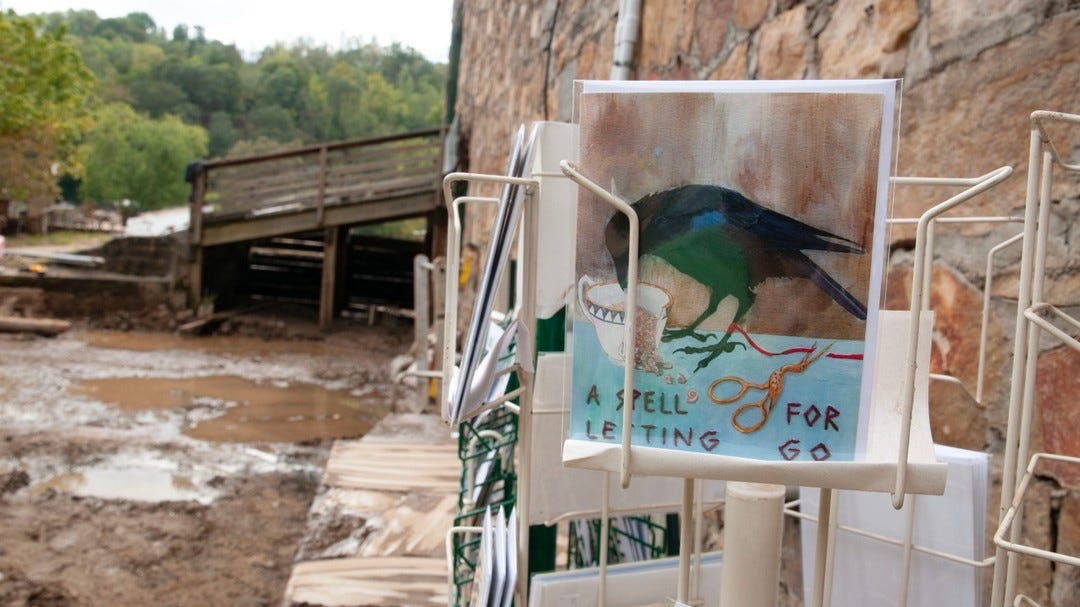I delivered a load of firewood earlier this week to a friend whose tiny house was severely damaged by flooding. Fortunately, it’s still structurally sound and with a fair amount of elbow grease—disinfecting, painting, replacing floors, and so on—she expects it to be livable again soon. In the meantime she is sleeping in a van parked on her family’s homestead.
The road they live on runs parallel to the Ivy River. Driving through the area, the immensity of the flood destruction smacks you in the face repeatedly. Your head is wont to swivel at short intervals, to stare gape-mouthed at houses turned to piles of sticks, 100-year trees torn out by the roots, cars and trucks mangled into misshapen heaps of metal. But of course, you resist the urge to rubberneck. The road is rough and driving requires extra caution. Another blessed redneck road repair made it possible in the early days for the people of this community to get out. Huge sections of the road have had the asphalt removed in order to create a drivable surface. From what I hear, before the intervention of hillbilly engineering, the road itself looked like a mountain range in miniature.
The Ivy River may not ever remember itself. It’s having an identity crisis. Am I a river? Am I a wetlands? Am I going to dry up and fizzle away? It used to be a wetlands, not a river, our friend tells us: thousands of little seasonal streams coursing all down the mountains and through the hollers, the land held together by the roots of thirsty wild things. It was shaped into this river form by early settlers, intent on making the land suitable for agriculture. And it held for this long. But now its exhausted banks have given out, stretching the width and shallowing the depth of this river. Nature’s own terraforming.
Many of this family’s neighbors lost their homes to the flood. They are staying with friends or living in tents or outbuildings while they figure out what to do. But one family had just gotten wonderful news: some kind soul had offered them a house on dry land to stay in for six months, rent free, while they rebuild their lives.
This seems to be happening a lot. Many houses in the region are normally maintained as short term rentals catering to tourists, and the owners are opening them up to house flood victims who have lost near everything they owned.
Most places I go, I see scales of destruction that would have been unimaginable before Helene paid us a visit. But also, I hear stories of the grit and resilience, the heroism, the generosity and caring of these Appalachian neighbors. It makes me so proud of them, so proud to belong here.
I’ve been introduced to some great Substack writers through this tragedy, other southern Appalachians who’ve taken to the ‘stacks to share their experiences with the world. Here’s a little round-up of some of my favorite posts.
Thank you all from the bottom of my heart for your donations, your prayers, and the love you have shown us southern Appalachians over the past week. If you would like to donate to a trusted relief effort and make sure 100% of your donation goes to the people who need it, consider the organizations on this list.
My family and I are safe. We are blessed. We were about as prepared as we could have been, in terms of food storage and the ability to survive without modern conveniences for a few days.
Although we were more fortunate than many of our neighbors in terms of property damage and access to needed supplies, this disaster has impacted my ability to earn income and pay the bills. If you feel so inspired, you can help me get through this by becoming a paid subscriber to this Substack for $5/month or making a one-time contribution through the Buy Me a Coffee link below. I am publishing updates on Helene recovery in southern Appalachia twice per week. In addition, my Prayer of the Week comes out each Sunday and I am working on new content focused on spirit-filled, heart-centered responses to the wider dystopia.








It is always pleasing to read these reports, to know that some people don't strike their colors and cry at the first bump in Life's Road.
Your voice is so calm and measured, Starr--so expressive of compassion and wisdom--that it's becoming a touchstone for me in these dystopian times. Having lived through Hurricane/Tropical Storm Irene in Vermont in 2011, I'm reminded that local communities rally in similar fashion everywhere, offering shelter and support to friends, neighbors, and family members with stunning perseverance, generosity, and resourcefulness. (As an extension of that, I was moved to tears when you reported that Maine lobstermen had donated muck boots to Appalachia . . . )
It's at times like these that we're reminded not only of what matters but also of who matters--who can be counted on for physical, moral, and spiritual support when the world turns topsy-turvy and a steady compass is needed. Having never lived in the South, I'm learning a lot from you about Appalachian culture, and I'm in awe at what you "hillbillies and hippies" are accomplishing together. I send much love to all of you, and I wish you ever-new and surprising blessings as you navigate through this. Abundant gratitude to you for sharing your observations and reflections with the rest of us . . .